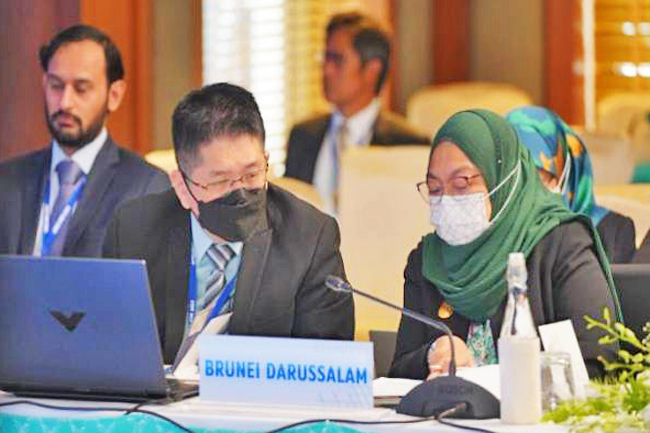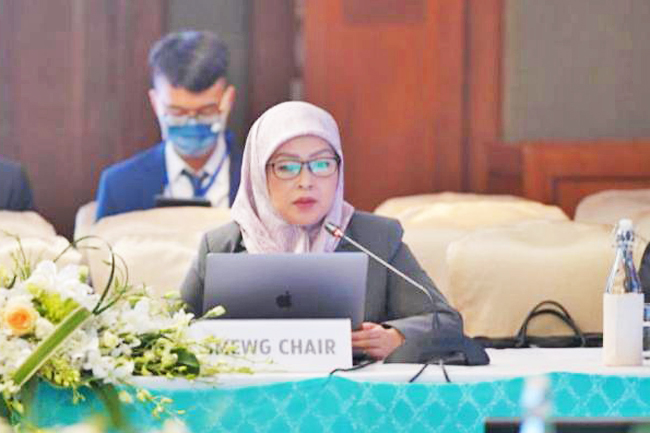James Kon
Digitalisation is one of Brunei Darussalam’s national priorities, whereby a Digital Economy Masterplan 2025 was launched in 2020 to guide efforts to achieve economic prosperity and sustainability through digital transformation.
Brunei Darussalam has been actively improving its infrastructure to support digitalisation efforts, not just benefitting the whole population including those in the most remote areas of Brunei Darussalam, but also to ease micro, small and medium enterprises (MSMEs) in their digital transformation.
The importance and progress of digitalisation in the Sultanate was shared by Deputy Minister of Finance and Economy Pengiran Datin Seri Paduka Hajah Zety Sufina binti Pengiran Dato Paduka Haji Sani during her remark at the 28th APEC Small and Medium Enterprises Ministerial Meeting (SMEMM) held at Phuket, Thailand from September 9-10.
The meeting was chaired by Thailand Deputy Prime Minister and Vice Chairman of the Board of Small and Medium Enterprises Promotion of Thailand Supattanapong Punmeechaow, and was attended by ministers and representatives responsible for MSMEs from all APEC economies.
Representatives from the APEC Business Advisory Council and the ASEAN Secretariat also attended the event.


Pengiran Datin Seri Paduka Hajah Zety Sufina added, “Brunei Darussalam continues to pursue improvements to the digital regulatory environment for businesses, including developing policies and systems to create an interoperable market structure to shift from paper-based to electronic-based services. There has also been an increase in programmes, capacity-building initiatives, and funding facilities to support the digital adoption of MSMEs in Brunei Darussalam.”
As this is the last term for Brunei Darussalam to chair the APEC SME Working Group (SMEWG), she also conveyed appreciation and gratitude to all APEC economies for their active participation and continuous cooperation throughout Brunei Darussalam’s chairmanship of the APEC SMEWG.
Under this year’s main theme ‘Inclusive Recovery of APEC MSMEs through Bio-Circular-Green Economy (BCG) and High Impact Ecosystem’, APEC economies recognise the need for MSMEs to prepare for a post-pandemic world.
Participants also shared best practices and presented their views on four sub-themes: ‘Accelerating BCG Adoption’, ‘Inclusive Digital Transformation’, ‘The Next Normal MSME Financing and Debt Restructuring’ and ‘Coping with Evolving Market Landscape: High Impact Policy.
Through the 2022 APEC SME Chair Statement, Thailand highlighted APEC economies’ commitment to have an open, dynamic, resilient, and peaceful Asia Pacific community by 2040 based on the APEC Putrajaya Vision 2040 for the prosperity of all the people and future generations, including through implementation of the Aotearoa Plan of Action.
Supattanapong Punmeechaow also encouraged APEC economies to remain committed in intensifying cooperation to improving opportunities for MSMEs including startups, youth and women to be competitive, specialised, innovative and expand into regional and global value chains.
The chair highlighted the importance of promoting “Inclusive Recovery of APEC MSMEs through the Bio – Circular – Green Economy (BCG) Model and High Impact Ecosystem”, which seeks to harness technology and innovation to support value creation for MSMEs’ products and services, reduce waste, and promote a sustainable business model.
The chair also emphasised on the critical role of digital transformation, innovation, and technology in businesses, hence, economies are encouraged to continuously improve digital infrastructure and access to financing, training, and other support to enable them to overcome barriers to participate and lead in the digital economy.
Furthermore, APEC economies need broader engagement of innovators and expert groups to create a favourable platform for the exchange of best practices and inclusive growth of youth entrepreneurship in APEC economies.
Prior to the ministerial meeting, the 54th APEC SMEWG meeting was held at the same venue from September 7-8.
Head of Business Development and Support of Darussalam Enterprise (DARe) Norlela binti Suhailee as Chairperson of the APEC SMEWG, presented the SMEWG report highlighting the group’s key activities and outcomes for 2022.
She also said the SMEWG will continue their work in implementing the working group’s Strategic Plan 2021-2024, focussing on relevant policies and programmes that aim to usher MSMEs into a post-pandemic world.







